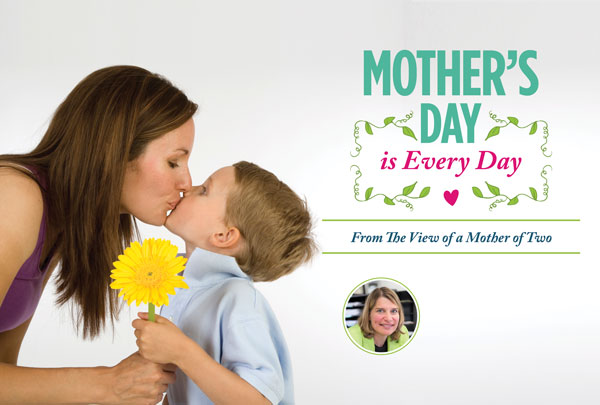
Resolving to Help Our Children in the New Year
Each year, I make New Year’s resolutions. It’s a holiday ritual I wouldn’t think of skipping. Most years, including last year, the top resolution is to get in better shape. All too often, this resolution lasts about two weeks and then gets left by the wayside. There are a lot of reasons for this, especially unrealistic expectations. Failure doesn’t have to be a foregone conclusion. There are ways to succeed.
Unrealistic expectations are ones that rarely get met. While it may seem that they give us a higher target to shoot for, achieving a goal is much like climbing a ladder; one does not go from the bottom rung to the top, but takes it one rung at a time. Expecting much from ourselves does give us a chance to excel, but it also sets us up to be disappointed if we do not quickly meet those goals.
Resolve for small victories. When we achieve that victory, we set another small one. This succession of small victories might even push us beyond that original, seemingly unrealistic expectation that we wanted to reach.
Mississippi’s Obesity Problem
According to data released by the Trust for America’s Health and the Robert Wood Johnson Foundation in September 2014, Mississippi has a problem. It’s not a problem that we are just hearing about, but it is one that’s getting worse — the statewide obesity rate. Among adults, 35.1% of the population is considered obese, tying Mississippi with West Virginia for worst. Among 10 to 17-year-olds, the rate is 21.7%. Where is our good news here?
 First, we can be grateful that our childhood obesity rate is less than our adult obesity rate. This suggests the possibility of improvement. Second, while the adult trend shows an increase in adult obesity, there has been a small drop in childhood obesity. We can take these positive trends and build on them.
First, we can be grateful that our childhood obesity rate is less than our adult obesity rate. This suggests the possibility of improvement. Second, while the adult trend shows an increase in adult obesity, there has been a small drop in childhood obesity. We can take these positive trends and build on them.
We should work to take the slowly dropping childhood obesity rate and keep up the momentum in order to extend our success. While programs such as healthy lunches in schools and farm-to-table programs are invaluable, home must also be part of the equation. Otherwise, chance are that any efforts in this vein will fail. We need to develop and promote healthy habits in our children.
Establishing Healthy Habits — What We Eat
We all know ways to begin to do this. We cut out sugary drinks. We cut out a lot of sweets and salty snacks. We promote healthy snacks in their place; carrots, celery, apples, and nuts can take the place of candy bars, ice cream, and cookies. We have to have a realistic plan, however. In my own experience, as an adult, to say “I’m not going to drink soft drinks” is setting myself up for failure. On the other hand, saying that I’ll let myself occasionally have one takes away the taboo. And if I go for two weeks without one and then have one… I wonder why I drink the things in the first place.
We have to watch what we eat. That part is simple. As parents, we should pay attention to the various food guidelines currently out there; a good place to start is the healthy plate model espoused by the FDA in place of the food pyramid we learned in school. The guidelines are good, but we need not simply take them as untested fact. Instead, we should work to understand the science behind them as much as we can. It is important to understand that we’re not going to be able to get kids to eat all the foods we want them to eat. We should get them to try new things until we find healthy foods they decide they want to eat.
 Healthy food doesn’t have to be boring. It can be fun. Tie healthy food into your child’s favorite food styles. If all your child will eat every night is grilled chicken nuggets, carrot sticks masquerading as french fries, green peas, and mashed potatoes, have no qualms about serving a healthy meal. If a child’s favorite food is pizza, make it at home with whole wheat crust and sneak some veggies in under the cheese. For sweet treats, go for fruits instead of cookies and candy. Every once in a while, it won’t hurt to allow something less than ideal as a treat and as a way to keep those foods from becoming taboo. Don’t use taboos. Instead use favorite food choices and make them healthy.
Healthy food doesn’t have to be boring. It can be fun. Tie healthy food into your child’s favorite food styles. If all your child will eat every night is grilled chicken nuggets, carrot sticks masquerading as french fries, green peas, and mashed potatoes, have no qualms about serving a healthy meal. If a child’s favorite food is pizza, make it at home with whole wheat crust and sneak some veggies in under the cheese. For sweet treats, go for fruits instead of cookies and candy. Every once in a while, it won’t hurt to allow something less than ideal as a treat and as a way to keep those foods from becoming taboo. Don’t use taboos. Instead use favorite food choices and make them healthy.
Establishing Healthy Habits — Physical Play
Especially important is exercise. For a child, this isn’t going to be going to the gym. Encourage them to get outside and play with friends and siblings. While this will be the primary avenue of play, don’t miss out on opportunities as a parent when they are presented. Throw a ball with them. Ride bikes together. If you live near a suitable place, take a nature walk and teach them a bit about the natural world around them at the same time. On the weekends, take time to make a day trip to a place where you can take a hike or go canoeing. Turn physical activity into something that’s fun — not an hour on a treadmill.
Establishing Healthy Habits — Avoiding the Body Image Trap
Don’t go overboard. The goal is to develop a healthy lifestyle and healthy body image in our children. We want to develop habits that they will stick with by choice, not something they do just because mom and dad say they must. Never equate healthy habits with physical appearance. The extreme opposite of obesity is not any better. Good, healthy habits are usually the result of trying to achieve and maintain a healthy lifestyle. Bad habits or being dangerously underweight are usually the result of trying to achieve and maintain an unhealthy body image. When we equate good health with perfect looks, we run the risk of promoting eating disorders and dangerous exercise habits. These are as much failures as being a couch potato and eating junk food.
Avoid telling children that they need to diet. Let the perspective be that you want them to be healthy and make good choices. If you focus on training them to make good choices instead of making the choices for them, they have a lesson for life.
There is one other thing. If we want to instill behaviors in our children, the best way we can do that is to model those behaviors. Maybe we can take a chunk out of that 35% of Mississippi adults who are obese in the process.
Justin Griffing is an author who has recently returned to Mississippi from Vermont.










 First, we can be grateful that our childhood obesity rate is less than our adult obesity rate. This suggests the possibility of improvement. Second, while the adult trend shows an increase in adult obesity, there has been a small drop in childhood obesity. We can take these positive trends and build on them.
First, we can be grateful that our childhood obesity rate is less than our adult obesity rate. This suggests the possibility of improvement. Second, while the adult trend shows an increase in adult obesity, there has been a small drop in childhood obesity. We can take these positive trends and build on them. Healthy food doesn’t have to be boring. It can be fun. Tie healthy food into your child’s favorite food styles. If all your child will eat every night is grilled chicken nuggets, carrot sticks masquerading as french fries, green peas, and mashed potatoes, have no qualms about serving a healthy meal. If a child’s favorite food is pizza, make it at home with whole wheat crust and sneak some veggies in under the cheese. For sweet treats, go for fruits instead of cookies and candy. Every once in a while, it won’t hurt to allow something less than ideal as a treat and as a way to keep those foods from becoming taboo. Don’t use taboos. Instead use favorite food choices and make them healthy.
Healthy food doesn’t have to be boring. It can be fun. Tie healthy food into your child’s favorite food styles. If all your child will eat every night is grilled chicken nuggets, carrot sticks masquerading as french fries, green peas, and mashed potatoes, have no qualms about serving a healthy meal. If a child’s favorite food is pizza, make it at home with whole wheat crust and sneak some veggies in under the cheese. For sweet treats, go for fruits instead of cookies and candy. Every once in a while, it won’t hurt to allow something less than ideal as a treat and as a way to keep those foods from becoming taboo. Don’t use taboos. Instead use favorite food choices and make them healthy.